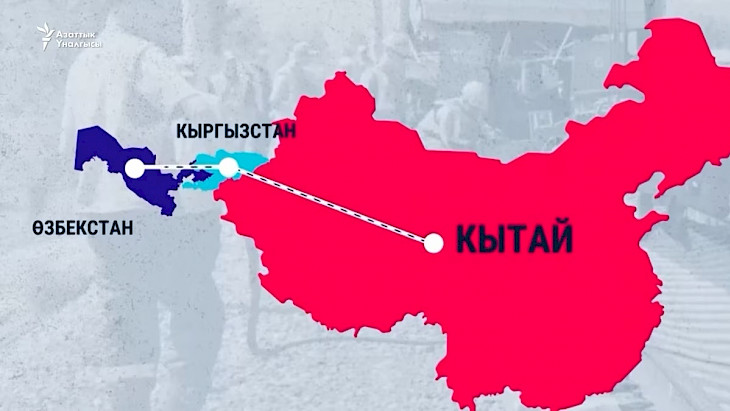The construction of a railway in Kyrgyzstan along the China-Kyrgyzstan-Uzbekistan route continues to provoke disagreements among experts and specialists, both European and Chinese, states an article in Avesta.
The ambitious project was discussed back in the 90s, but progress only started in recent years. Kyrgyzstan's President Sadyr Japarov even announced that construction would begin this year. Undoubtedly, for Kyrgyzstan, a landlocked country, developing railway infrastructure is important, and such a significant project involving three countries has substantial potential.
However, the feasibility of building the railway and the costs still raise significant doubts. "The project is ready, but Beijing, Bishkek, and Tashkent have not yet agreed on the financing proportions. This issue may drag on for a very long time. Kyrgyzstan and Uzbekistan lack funds, while China could build it alone, but this railway is not a priority for them," noted Gennady Bessonov, the Secretary-General of the International Coordinating Council on Trans-Eurasian Transportation, in an interview with the Eurasian Information League.
It's worth noting that Kyrgyzstan doesn't have the funds for the $4.7 billion project. According to Raïmkul Mendekeev, the Director of the Scientific and Technical Center for Construction and Architecture at the Kyrgyz State Technical University, the cost of building the railway within Kyrgyzstan alone is estimated at $1.34 billion, a considerable sum for the country.
Currently, Chinese specialists have prepared the technical and economic justification, and the question remains about finding investors to implement the project. Local residents are concerned about the increasing presence of China in Kyrgyzstan: surveys show that citizens would prefer to see more European investments. Meanwhile, EU investors are cautiously looking at the Kyrgyz project, citing its lack of profitability and profitability, and recalling the incident of the nationalization of the Kumtor gold deposit.
Even if the project is successful, there is no certainty as such investments will yield returns only in 30-40 years, depending on the volume of freight and passenger traffic. The challenge lies in the substantial costs of constructing such a large transnational railway, including laying tracks through difficult terrain, building bridges and tunnels, not to mention land acquisition.
Recently, President Japarov even stated that Kyrgyzstan's authorities are "considering implementing the project through other means - not through external borrowing." He did not specify which means but, apparently seeing the lack of investor interest, the country will try to manage with what it has.
It's a dubious venture. In December 2023, a round table was held in China where representatives of the scientific community expressed concerns about the project's lack of profitability. Experts from EU countries, Kyrgyzstan, Uzbekistan, Russia, and China confirm that such an ambitious project, passing through three countries and aimed at more grandiose plans, is technically challenging to implement.
In particular, the challenge lies in coordinating the actions of all participating countries, including tariffs and customs procedures, as profitability will be hindered without all of this. Moreover, the railway route through politically sensitive and geographically complex areas may lead to unexpected delays and increased costs.
Organizers of the project also overlook the fact that the already constructed railway will face competition from existing well-established routes, such as the Trans-Siberian Railway and maritime transport.
With such well-established routes, it's unlikely that logisticians will want to seek other transportation routes, especially longer ones. The key role here will be played by the ability of the new railway line to offer economically efficient, reliable, and fast services - otherwise, its profitability and even feasibility will be in question.
Overall, the railway along the China-Kyrgyzstan-Uzbekistan route has the potential for profitability due to expanded trade, economic integration, and reduced transportation costs. However, its construction remains a contentious issue among experts and investors due to existing serious problems and uncertainties that could affect its financial success.
Experts agree that a thorough analysis of all aspects of the project and reasoned decisions are necessary for its successful implementation.
Source: Avesta.tj
CentralasianLIGHT.org
March 28, 2024

